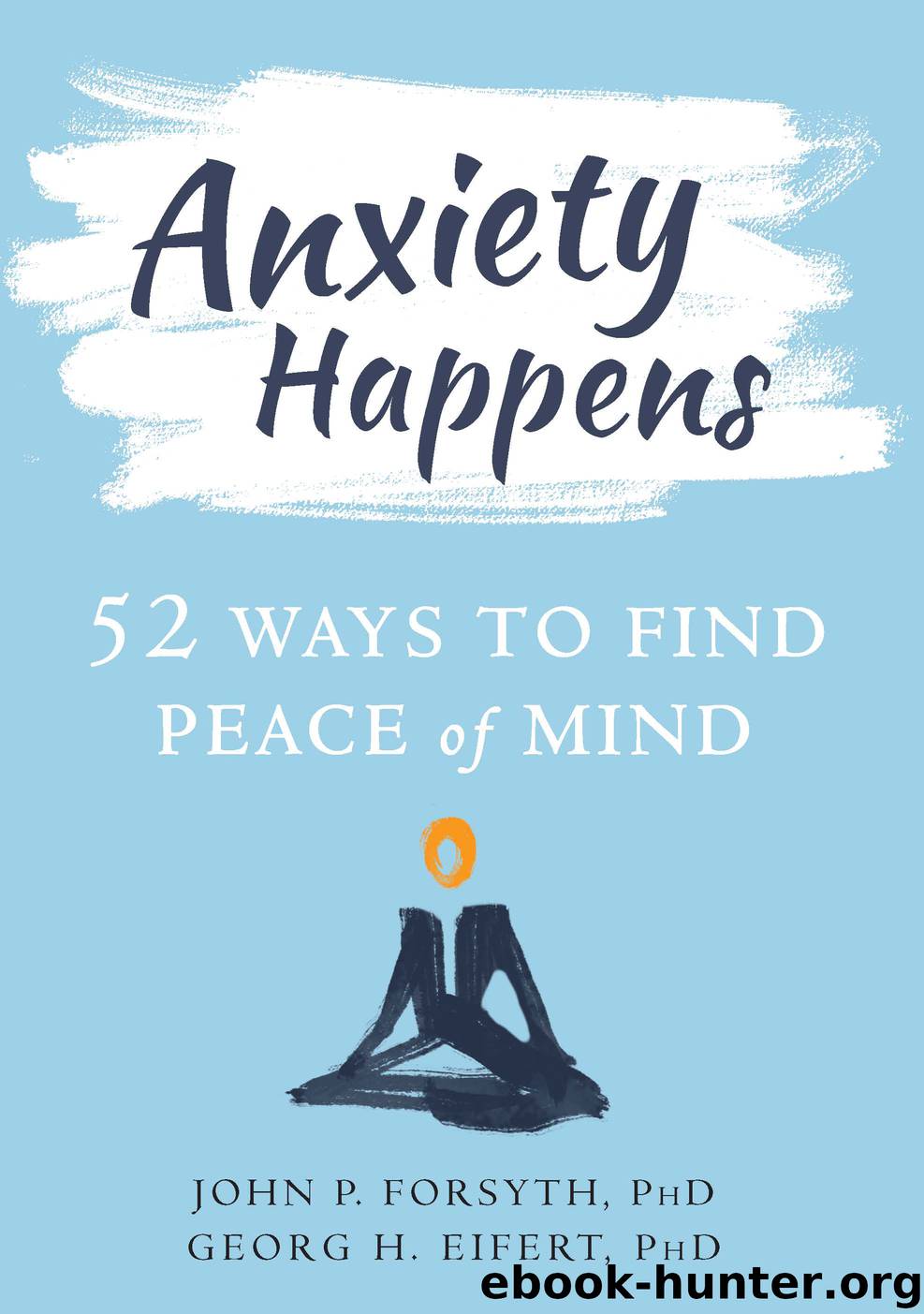Anxiety Happens by John P. Forsyth

Author:John P. Forsyth
Language: eng
Format: epub
Publisher: New Harbinger Publications
Published: 2018-03-22T16:49:43+00:00
26
Let It Be
A great source of suffering is getting attached to wanting more of something and less of something else. This condition is easy to spot when you feel anxious or afraid: you want less anxiety and more peace and joy. If you’re bored, you want more excitement. If you’re unhappy, you want more happiness.
“Want” literally means a lack or deficiency. So when you want your thoughts and feelings to be different, your mind is essentially telling you that you are lacking or deficient. Not only does that hurt, but it’s also a great setup for struggle.
This is when nurturing your observer self can be very useful. As an observer, you watch what’s going on and learn to allow your experience to be just as it is without wanting it to be different.
Let’s see what a fictitious game of chess can teach us about looking at your experience from an impartial observer perspective, without wanting to pick sides, or doing so.
To Play or Watch the Game?
Imagine you’re part of a chess game. The dark pieces represent your anxieties and fears and everything that might trigger them. The light pieces represent your typical counterstrikes, each and every coping strategy you use to deal with anxiety and fear.
So when the dark knight attacks (for example, “I’m about to lose it”), you get on the back of the white knight, ride into battle armed with your coping strategies, and try to use them to knock the dark knight out: breathe…distract…think positive thoughts…procrastinate…leave the situation…give up…and on and on.
But this is not your typical chess game. In this game, we don’t have two different players, each taking sides. Instead, the two opposing teams are really one team: you! The thoughts, feelings, and actions on both sides of the board are your thoughts, feelings, and actions. They all belong to you.
In this way, the game is rigged. Both sides will always know the other’s moves. Worse, no matter which side wins now and then, one part of you will always be a loser. There’s really no way to come out a winner when your own thoughts and feelings compete against each other.
Let’s step back for a moment. What if those chess pieces aren’t you, anyway? Can you imagine what a great relief it would be if you didn’t need to be a player with a stake in the outcome? Can you see who else you might be?
Let’s suppose you’re the board. As the board, your job is to hold all the pieces. The board doesn’t care about winners or losers. The board does not take sides or get involved in the battle. It just provides space for the game and allows it to happen.
As the board, you can choose to be an impartial observer of your experiences.
Thinking of yourself as a chessboard may seem odd, at least at first. But over time, taking the perspective of the board will become easier and it will provide tremendous relief. This relief is based on a deeper experience and understanding of who you really are.
Download
This site does not store any files on its server. We only index and link to content provided by other sites. Please contact the content providers to delete copyright contents if any and email us, we'll remove relevant links or contents immediately.
Rewire Your Anxious Brain by Catherine M. Pittman(18654)
The Code Book by Simon Singh(3189)
The Wrong McElroy by KL Hughes(2488)
How to Be Yourself by Ellen Hendriksen(2422)
No Worries by Sarah Edelman(2251)
Anxious for Nothing by Max Lucado(1975)
Life After Darkness by Michelle Knight(1968)
The Velvet Rage by Alan Downs(1885)
I Really Didn't Think This Through by Beth Evans(1795)
Unfuck Your Brain: Using Science to Get Over Anxiety, Depression, Anger, Freak-Outs, and Triggers by Faith G Harper(1763)
The Anxiety Workbook by Arlin Cuncic MA(1695)
First, We Make the Beast Beautiful by Sarah Wilson(1664)
Free Yourself from Fears by Joseph O'Connor(1646)
How Not to Worry by Paul McGee(1618)
You Can Do All Things by Kate Allan(1602)
The Worry Trick by David A Carbonell(1521)
Coping with Anxiety by Edmund Bourne & Lorna Garano(1508)
Need by Unknown(1471)
The Sensory Child Gets Organized by Carolyn Dalgliesh(1448)
